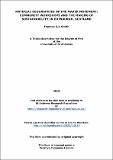Files in this item
Material geographies of the maker movement : community workshops and the making of sustainability in Edinburgh, Scotland
Item metadata
| dc.contributor.advisor | Reid, Louise Anne | |
| dc.contributor.advisor | Clayton, Daniel Wright | |
| dc.contributor.author | Smith, Thomas S. J. | |
| dc.coverage.spatial | iv, 335 p. | en_US |
| dc.date.accessioned | 2018-02-28T10:00:49Z | |
| dc.date.available | 2018-02-28T10:00:49Z | |
| dc.date.issued | 2018-06-27 | |
| dc.identifier.uri | https://hdl.handle.net/10023/12815 | |
| dc.description.abstract | Recent years have seen the emergence of a novel type of community space around the world, labelled variously as makerspaces, hackerspaces, hacklabs, Fab Labs, and repair cafés. These workshops, often known collectively as the ‘maker movement’, have inspired considerable speculation regarding their potential to prefigure a more sustainable economy, including a shift to localised and participatory forms of production and consumption (Smith and Light, 2017). Until recently, the social scientific work on such spaces has been sparse, especially in-depth ethnographic work, though scholars are increasingly turning their attention to them, particularly in the fields of design and science and technology studies. This thesis, a practice-led ‘enactive ethnography’ drawing from three case study workshops in Edinburgh, Scotland, explores the question of sustainable development and maker spaces along two main axes: firstly, the emergence of sustainable practice in such spaces, and secondly, the relevance of such spaces to the cultivation of human wellbeing. The thesis is the first examination of such spaces drawing from developments in social theory towards relational materialism, more-than-representational approaches, and a focus on social practice. It draws a number of conclusions. Firstly, that claims of an undifferentiated global ‘maker movement’ may be exaggerated: the grassroots participant-led creation of such spaces results in irreducible diversity and local differentiation. Secondly, while claims about the potential of such spaces for reconfiguring global production and consumption are overstated, when viewed from a practice-oriented perspective, the communities of practice populating such sites comprise potent and potentially-valuable crucibles of knowledge and materials. And thirdly, trying to move away from individualistic conceptions of wellbeing, the case studies provided evidence for the shared workshops playing a crucial role in the contingent emergence of participant wellbeing. These findings are further developed in tandem with a posthuman reading of maker practices, contributing to timely scholarly debates on ‘making’ and ‘craft’. | en_US |
| dc.language.iso | en | en_US |
| dc.publisher | University of St Andrews | en |
| dc.rights | Attribution-NonCommercial-NoDerivatives 4.0 International | * |
| dc.rights.uri | http://creativecommons.org/licenses/by-nc-nd/4.0/ | * |
| dc.subject | Sustainability | en_US |
| dc.subject | Human geography | en_US |
| dc.subject | Craft | en_US |
| dc.subject | Community economies | en_US |
| dc.subject | Practice theory | en_US |
| dc.subject.lcc | N6498.H36S6 | |
| dc.subject.lcsh | Handicraft in art | en |
| dc.subject.lcsh | Handicraft--Scotland | |
| dc.subject.lcsh | Sustainable living | |
| dc.title | Material geographies of the maker movement : community workshops and the making of sustainability in Edinburgh, Scotland | en_US |
| dc.type | Thesis | en_US |
| dc.contributor.sponsor | University of St Andrews. 7th century Scholarship | en_US |
| dc.type.qualificationlevel | Doctoral | en_US |
| dc.type.qualificationname | PhD Doctor of Philosophy | en_US |
| dc.publisher.institution | The University of St Andrews | en_US |
The following licence files are associated with this item:
This item appears in the following Collection(s)
Except where otherwise noted within the work, this item's licence for re-use is described as Attribution-NonCommercial-NoDerivatives 4.0 International
Items in the St Andrews Research Repository are protected by copyright, with all rights reserved, unless otherwise indicated.


